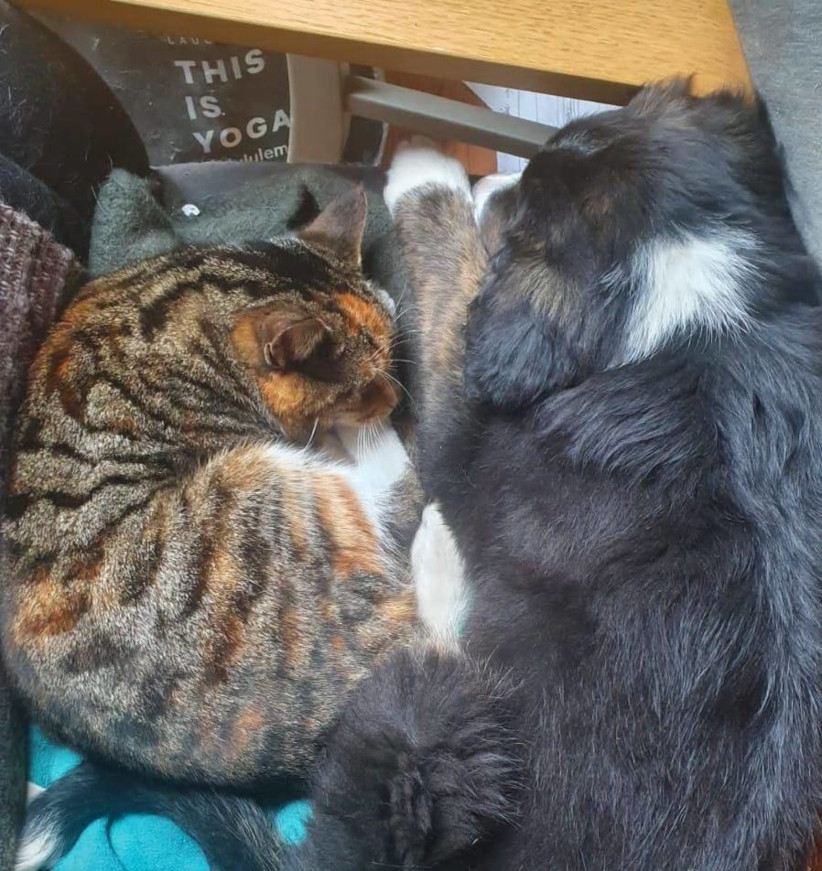Macalla means the ‘hill of the echo’ in Irish and is the name for the green hill above our house and residential centre. We like to think that there are indeed vibrations filling the air – a resounding of Michael Joe’s legacy – the work we’re doing resonating further afield, just as we have tuned into the reverberations of the regenerative work of those we continue to learn from.
The farm is made up of diverse habitats – a large area of upland mountain and bog which becomes a vibrant purple in August when the heather blooms. Lowland multispecies grassland undulating over pre- and post- famine cultivation ridges. A very special native woodland on a north facing slope, the other side an area of severe cutaway bog- a stark reminder of the effect of historical resource extraction. A tree plantation of broadleaf and native species, more trees planted in corners and edges of fields. Our gardens and polytunnels finding their sheltered niche below Macalla. Nevertheless, these habitats bearing the brunt of Atlantic weather systems, extreme wind, rain, salt on marginal and acidic soils, a climate that is warming, becoming measurably more extreme and unpredictable.
Garden
Despite there being only a quarter of an acre under cultivation, we are able to grow almost all vegetables and fruit needed to feed not only our family and volunteers but to supply the vegetarian meals for courses and in the cafe. We’re now growing more to offer produce more widely on the island.
We’re often amazed at how much we can grow (mostly thanks to the polytunnels) -we once counted how many different veg crops we were growing and stopped counting at 50 – we grow a lot of heritage varieties – more than 12 different types of tomatoes for example and use organic, open source seed, some of which we have saved ourselves.
We use no chemicals and are constantly learning how to work more intelligently with natural systems to improve productivity and problem solve pest or disease issues, moving more towards a no-dig system, one that is regenerating biological activity in the soil.
Each year the entire process of germination to harvest never fails to amaze and when at the end of the season the harvest is of kilos kilos of tomatoes, butternut and grapes, we have to pinch ourselves that this has all grown on a wind swept rock in the Atlantic.
macalla animals
Our lives are inextricably linked with the animals we share the farm with and can’t imagine a world without them. They all have jobs to do to some degree- the dogs with their sheep gathering duties, the cats and their mice patrol, the milking sheep providing our family with yoghurt, kefir and cheese, the ducks laying eggs, the horses making themselves available to be ridden and providing nutrients for the compost.
We aim to care for them in the most natural way possible and are moving towards a fully chemical free management system for both the sheep and horses. We ride the horses bitlesss and without shoes, using natural hoof trimming methods.
But more than anything else, they help us move outside of our human-centric world and come into relation with other non-human beings. A sort of applied mindfulness, informing our yoga practice and teaching, helping others to reconnect to experience through our retreats. They offer us continuous lessons in embodiment and being present.
woodland
The woodland is located on a north facing slope at the most sheltered part of the farm, nearest the sea. Covering roughly 2 ha, there are birch, hazel, holly, mountain ash, willow and oak. And, of course, it is filled with ivy, ferns, moss, bluebells, insects, and birds – a biodiverse ecosystem bursting with life. A present day glimpse into what this type of west of Ireland habitat looked like in the past, a survivor of the catastrophes of the 19th century demographics and famine.
It is an honour to be its steward of this special place. It was fenced off from livestock nearly 30 years ago, it never ceases to amaze to see how the birch are reseeding – uphill and against the prevailing wind, against all the odds in such inclement conditions. We now graze sheep amongst the trees in the autumn and winter, our ongoing agroforestry experiment.
Since the mid 90’s over 5000 trees have been planted, they’ve gone in wherever they can go – on edges, in corners making thickets and copses. The largest plantation planted in an old hay meadow over 25 years ago connects the woodland along the valley below our house. When the first canopy closed above a copse of ash, the feeling was hard to describe – the exhileration of nature’s processes coupled with the relentles passage of time?
climate / biodiversity mitigation
Our choice two decades ago, to settle on Clare Island, start a family, live more closely on the land, came about largely due to our awareness of the precarious state of the environment. There was a sense that yes, we could do our bit by opting out, limit our consumption and carbon footprint by growing our own food, installing solar panels, minimizing waste, composting, keeping bees.
All these things we continue to do, but it has become apparent for a good while that this is not enough. The enormity of the crisis we’re living in demands a full reckoning. How we cultivate the soil and keep our animals, how we use energy, what purchases we make, how we travel, what and how we teach, all take place within the context of the crisis and the choices we make.
We are continuously exploring regenerative approaches and have come to regard decision making on every level to be an ethical practice.
Theo and Maude, our two children have increased the focus with their climate activism. They continue to inspire and push us more urgently to action. You can listen to Theo’s podcast here





